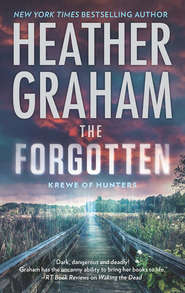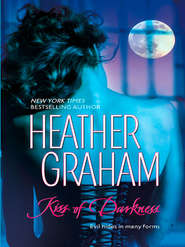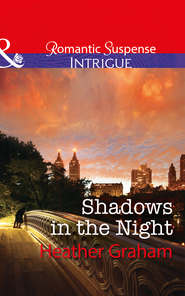По всем вопросам обращайтесь на: info@litportal.ru
(©) 2003-2024.
✖
Phantom Evil
Автор
Год написания книги
2019
Настройки чтения
Размер шрифта
Высота строк
Поля
“I’m sorry,” she murmured uncomfortably. Damn him! She didn’t need to be apologizing to him.
“One thing is true—we can’t undo the past. We can only do our best in the present, and hope to find the answers in the future. Dessert? Coffee?” he asked her.
She shook her head. “No, thank you.”
“Want to split a bread pudding? It’s out of this world here.”
She sat back, still uneasy, and totally baffled by his ability to remain so unruffled. She had been tested throughout dinner, she realized.
“I’m fine, thank you.”
“Another glass of wine?” he asked.
“Fine, why not?”
He ordered brandy and bread pudding, and she had another glass of wine. His conversation turned casual. He talked about his love for the city; he had worked here for nearly a year when he had first joined the bureau. “Things are always just a little bit different in these parts. Louisiana laws are still based on Napoleonic Code—French law—while the majority of the country is based on English law. It’s not major, but there are some differences. You’ll note they have parishes instead of counties.”
“I went to Tulane. I know that,” she told him. Inane. He had her dossier.
“And majored in history and philosophy,” he said.
She nodded. “And you?”
He shrugged. “I spent six years in college. I liked it. I might have stayed a college student all my life, but it doesn’t pay the bills. World religions, history and psychology.”
Angela frowned. “Psychology, of course. You were with a Behavioral Science Unit. So, tell me, because I was thinking today that someone as involved as Regina was in preparing that home to be the perfect welcoming point for her husband wouldn’t have committed suicide. And to be honest, suicide had sounded like an entirely rational explanation to me before.”
“It’s hard to say. I didn’t know her,” Jackson said.
Dessert and drinks arrived. He was persuasive; she did try the bread pudding, and it was delicious. And it felt oddly intimate to share a dessert. She hadn’t done so in years. Since Griffin had died.
He sipped his brandy. “It does seem as if she was devoted to her husband, and as if she had determined to put her life to good use. That speaks against suicide. But then again, the loss of a child might have made her snap.”
“But that kind of snap? Going over a balcony?” Regina asked.
“That’s what we’re here to find out,” he told her.
They left soon after. The walk back down Chartres Street was quiet; they took St. Peter’s up to Dauphine and crossed Bourbon once again. They were at the more subdued end of Bourbon there, but distracted, Angela had been walking a few steps ahead.
“Hey, honey, wanna party?” someone asked.
He was a blond frat boy. He looked harmless. He was with other blond frat boys.
She could take care of herself, she knew. But Jackson stepped forward easily, slipping an arm around her. “Not tonight, but you all have a good time, and take care,” he said pleasantly.
The frat boys waved and went on. Jackson’s hold on her eased, but they walked next to each other.
He didn’t say anything; neither did she. He knew she could have managed on her own; she knew that he had quickly defused the situation.
And then they were back. They’d left lights on, and the house on Dauphine stood white and dignified in the moonlight, captured in shadow and in a soft glow. The windows might have been eyes, and, Angela thought, the ghosts of dozens of lost souls might have looked out from behind them, gazing at the world they had left behind.
The house wasn’t evil, but evil had lived behind the facade.
Angela was suddenly certain that Regina Holloway had not committed suicide.
CHAPTER FOUR
Before retiring for the night, Jackson had done a survey of the house, studying the alarm system.
He’d learned two things: every window in the house was properly wired; and though the gate to the courtyard was wired as well, only the gate was wired. It would have been possible for someone to climb the wall into the courtyard. However, once that happened, they’d have to have the code to get through the alarm.
Even so, it was possible and probable—no matter how excellent a police force might be—that someone had come over the wall. After that…
It had been twilight when Regina Holloway died. A time when someone might have slipped over the wall. A time when she might have had the alarm off, since she had been out on the balcony. She might have had the doors locked, but if she had opened her bedroom doors to the balcony—or if anything had been left open by one of the maids—there would have been access to the house.
The night, however, was uneventful.
Angela Hawkins was still asleep when he came down to the kitchen. There was little there, but someone had seen to it that some basics had been stocked, so he was able to brew coffee and munch on one of the English muffins that had been left in a package in the refrigerator.
He called to set up an interview with the senator. First, he reached a secretary, and then was put through to the senator’s aide, Martin DuPre, and while he was asking DuPre if the senator would be available for an appointment, DuPre’s protective hedging came to a quick halt when the senator himself came on the line. He assured Jackson that he’d be there that evening around five or five–thirty, and that their investigation was the most important issue in his life at the moment. He was glad to be in New Orleans at the moment, since the state legislature wasn’t in session. He hadn’t lived at the house since his wife had died; he had taken an apartment in the city.
Jackson was in the kitchen, working on notes for the investigation, when the doorbell rang.
Answering it, he discovered a young man with a guitar case strung over his shoulder and an overnight bag in his hand.
“Hi,” the visitor said.
“Can I help you?” Jackson asked.
The young man extended a hand. “You have to be Jackson Crow. I’m Jake Mallory. I know it’s kind of early, but I grew up in the Garden District, and I was awake—and here I am.”
“Jake. Good to meet you. Come on in.”
Jackson kept his tone level, his greeting polite.
But he wondered what the hell Adam Harrison had been thinking.
Jake Mallory was tall, probably half an inch short of his own height. He had auburn, slightly long hair, an angular, well–defined face and light green eyes. His build was more lanky than bulky, but he looked as if he was about to play guitar on the streets for money. It wasn’t that he looked unkempt; he was fastidious and probably extremely attractive to young women. He just didn’t have the look of someone about to become part of an elite investigation unit.
If this was, in truth, an elite investigation unit.
Then, again, maybe he looked exactly the part, just because he didn’t offer the customary appearance.
Jake walked in and whistled at the great entry slash ballroom. “Wow. I’ve heard about this place all my life. I’ve never been in it.” He set down his bag and let the guitar case slide slowly to the parquet.
“It’s quite a house,” Jackson said.
Jake met his gaze. “Amazing. Huge, so it seems. How was your night?”











